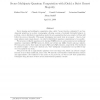25 search results - page 4 / 5 » Mixed States in Quantum Cryptography |
APPROX
2004
Springer
14 years 13 days ago
2004
Springer
A quantum encryption scheme (also called private quantum channel, or state randomization protocol) is a one-time pad for quantum messages. If two parties share a classical random s...
TIT
2002
13 years 6 months ago
2002
Abstract--We consider visible compression for discrete memoryless sources of mixed quantum states when only classical information can be sent from Alice to Bob. We assume that Bob ...
TCC
2007
Springer
14 years 1 months ago
2007
Springer
Assume that two distant parties, Alice and Bob, as well as an adversary, Eve, have access to (quantum) systems prepared jointly according to a tripartite state ρABE. In addition, ...
CORR
2011
Springer
13 years 2 months ago
2011
Springer
We introduce a graphical framework for Bayesian inference that is sufficiently general to accommodate not just the standard case but also recent proposals for a theory of quantum...
FOCS
2006
IEEE
14 years 1 months ago
2006
IEEE
Secret sharing and multiparty computation (also called “secure function evaluation”) are fundamental primitives in modern cryptography, allowing a group of mutually distrustfu...

